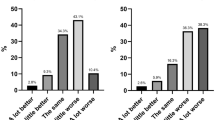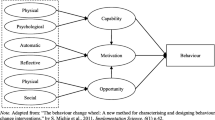Abstract
Aim
Children’s psychosocial factors related to healthy meal preparation are important for sustainable healthy dietary behaviour. At present, there is no valid and reliable tool to measure children’s psychosocial factors related to healthy meal preparation. Hence, this study aimed to develop, validate and determine the reliability of a questionnaire designed to measure psychosocial factors related to healthy meal preparation among Malaysian children.
Subjects and methods
This cross-sectional study included 250 children aged 9–11 years. The questionnaire developed was tested for face and content validity. Item analysis was conducted for the knowledge domain. Construct validity of attitude, practice and self-efficacy domains was assessed using exploratory factor analysis with principle axis factoring extraction and direct oblimin rotation. Cronbach’s alpha coefficient and Kuder-Richardson Formula 20 assessed internal consistency. The intraclass correlation coefficient determined test-retest reliability.
Results
All experts rated the questionnaire with a > 0.75 validity index. The knowledge domain had the optimal level of difficulty and could discriminate children with top and lower scores. Three-factor solutions emerged for the attitude domain and two-factor solutions emerged for the practice and self-efficacy domains, with appropriate factor loadings (> 0.40). Internal consistency ranged from 0.63–0.75 for the respective domains and an overall internal consistency of 0.82 for the whole questionnaire. Intraclass correlation coefficients ranged from 0.85–0.89 for the respective domains.
Conclusion
Outcomes demonstrated that the questionnaire is a reliable and valid evaluation tool and can be adapted by countries to use in hands-on healthy meal preparation interventions to advocate healthy dietary behaviours among children.
Similar content being viewed by others
References
Allirot X, da Quinta N, Chokupermal K, Urdaneta E (2016) Involving children in cooking activities: a potential strategy for directing food choices toward novel foods containing vegetables. Appetite 103:275–285. https://doi.org/10.1016/j.appet.2016.04.031
Altman DG (1991) Practical statistics for medical research. Chapman & Hall, London
Aron A, Aron E, Coups EJ (2006) Statistics for psychology, 4th edn. Pearson Education Inc, New Jersey
Baranowski T, Davis M, Resnicow K et al (2000) Gimme 5 fruit, juice, and vegetables for fun and health: outcome evaluation. Health Educ Behav 27:96–111
Branscum P, Sharma M, Kaye G, Succop P (2010) An evaluation of the validity and reliability of a food behavior checklist modified for children. J Nutr Educ Behav 42:349–352
Caraher M, Seeley A, Wu M, Lloyd S (2013) When chefs adopt a school? An evaluation of a cooking intervention in English primary schools. Appetite 62:50–59. https://doi.org/10.1016/j.appet.2012.11.007
CDC (2018) Middle Childhood (9–11 years old): Child Development. https://www.cdc.gov/ncbddd/childdevelopment/positiveparenting/middle2.html. Accessed 1 Aug 2018
Cerny BA, Kaiser HF (1977) A study of a measure of sampling adequacy for factor-analytic correlation matrices. Multivar Behav Res 12:43–47. https://doi.org/10.1207/s15327906mbr1201_3
Chen ST, Soo KL, Rahman AA et al (2013) Development and pilot testing of nutrition KAP questionnaire in persons with disabilities (KAP-nOKU) among trainers in rehabilitation centres, Malaysia.pdf. Pak J Nutr 12:708–714
Comrey AL, Lee HB (1992) A first course in factor analysis, 2nd edn. Lawrence Erlbaum Associates, New Jersey
Costello AB, Osborne JW (2005) Best practices in exploratory factor analysis: four recommendations for getting the most from your analysis. Pract Assess Res Educ 10:1–9
Cunningham-Sabo L, Lohse B (2013) Cooking with kids positively affects fourth graders’ vegetable preferences and attitudes and self-efficacy for food and cooking. Child Obes 9:549–556. https://doi.org/10.1089/chi.2013.0076
De Pelsmaeker S, Schouteten J, Gellynck X (2013) The consumption of flavored milk among a children population. The influence of beliefs and the association of brands with emotions. Appetite 71:279–286
Doustmohammadian A, Omidvar N, Keshavarz-Mohammadi N et al (2017) Developing and validating a scale to measure food and nutrition literacy (FNLIT) in elementary school children in Iran. PLoS One 12:1–18
Drost EA (2011) Validity and reliability in social science research. Educ Res Perspect 38:105–123
Ford ND, Patel SA, Narayan KMV (2017) Obesity in low- and middle-income countries: burden, drivers, and emerging challenges. Annu Rev Public Health 38:145–164
Guilford JP (1954) Psychometric methods, 2nd edn. McGraw-Hill, New York
Hersch D, Perdue L, Ambroz T, Boucher JL (2014) The impact of cooking classes on food-related preferences, attitudes, and behaviors of school-aged children: a systematic review of the evidence, 2003–2014. Prev Chronic Dis 11:140267
Huang M-C, Huang C-C, Thomas K (2006) Febrile convulsions: development and validation of a questionnaire to measure parental knowledge, attitudes, concerns and practices. J Formos Med Assoc 105:38–48
Jabatan Pendidikan Wilayah Persekutuan Kuala Lumpur (2013) Sekolah-sekolah Wilayah Persekutuan Kuala Lumpur. http://jpwpkl.moe.gov.my/index.php/sekolah. Accessed 2 Jan 2018
Jarpe-Ratner E, Folkens S, Sharma S et al (2016a) An experiential cooking and nutrition education program increases cooking self-efficacy and vegetable consumption in children in grades 3–8. J Nutr Educ Behav 48:697–705.e1. https://doi.org/10.1016/j.jneb.2016.07.021
Jarpe-Ratner E, Folkens S, Sharma S et al (2016b) An experiential cooking and nutrition education program increases cooking self-efficacy and vegetable consumption in children in grades 3–8. J Nutr Educ Behav 48:697–705 e1
Kelder S, Cribb P, Hoelscher DM, et al (2005) The CATCH Kids Club: a pilot after-school study for improving elementary students’ nutrition and physical activity. Public Health Nutr 8:133–140. https://doi.org/10.1079/phn2004678
Khodaee GH, Moghadam ZE, Khademi G, Saeidi M (2015) Healthy diet in children: facts and keys. Int J Pediatr 3:1183–1194
Kline P (1999) Handbook of psychological testing, 2nd edn. Routledge, London
Koo HC, Poh BK, Ruzita AT (2016) Development, validity and reliability of a questionnaire on knowledge, attitude and practice (KAP) towards whole grain among primary school children in Kuala Lumpur, Malaysia. Int Food Res J 23:797–805
Levy J, Auld G (2004) Cooking classes outperform cooking demonstrations for college sophomores. J Nutr Educ Behav 36:197–203
Liquori T, Koch PD, Ruth Contento I, Castle J (1998) The cookshop program: outcome evaluation of a nutrition education program linking lunchroom food experiences with classroom cooking experiences. J Nutr Educ 30:302–313
Lohse B, Cunningham-Sabo L, Walters LM, Stacey JE (2011) Valid and reliable measures of cognitive behaviors toward fruits and vegetables for children aged 9 to 11 years. J Nutr Educ Behav 43:42–49. https://doi.org/10.1016/j.jneb.2009.12.006
Martikainen P, Bartley M, Lahelma E (2002) Psychosocial determinants of health in social epidemiology. Int J Epidemiol 31:1091–1093
Mead E, Gittelsohn J, De Roose E, Sharma S (2010) Important psychosocial factors to target in nutrition interventions to improve diet in Inuvialuit communities in the Canadian Arctic. J Hum Nutr Diet 23:92–99
O’Hare L, Santin O, Winter K, McGuinness C (2016) The reliability and validity of a child and adolescent participation in decision-making questionnaire. Child Care Health Dev 42:692–698. https://doi.org/10.1111/cch.12369
Oxford Dictionaries Definition of psychosocial in English by Oxford Dictionaries. https://en.oxforddictionaries.com/definition/psychosocial. Accessed 2 Aug 2018
Pallant J (2011) SPSS Survival Manual, 4th edn. Allen and Unwin, Australlia
Parmer SM, Salisbury-Glennon J, Shannon D, Struempler B (2009) School Gardens: An Experiential Learning Approach for a Nutrition Education Program to Increase Fruit and Vegetable Knowledge, Preference, and Consumption among Second-grade Students. J Nutr Educ Behav 41:212–217. https://doi.org/10.1016/j.jneb.2008.06.002
Parmenter K, Wardle J (2000) Evaluation and Design of Nutrition Knowledge Measures. J Nutr Educ 32:269–277
Pinna GD, Maestri R, Torunski A et al (2007) Heart rate variability measures: a fresh look at reliability. Clin Sci 113:131–140
Sabramani VAL, Idris IB, Sutan R et al (2015) Managing obesity in malaysian schools: are we doing the right strategies? Malaysian J Public Heal Med 15:75–83
Santarossa S, Ciccone J, Woodruff SJ (2015) An evaluation of the Kinect-Ed presentation, a motivating nutrition and cooking intervention for young adolescents in grades 6–8. Appl Physiol Nutr Metab 40:945–950. https://doi.org/10.1139/apnm-2015-0110
Schunk DH (2012) Learning theories an educational perspective, 6th edn. Pearson Education Inc, Boston
Thompson VJ, Bachman CM, Baranowski T, Cullen KW (2007) Self-efficacy and norm measures for lunch fruit and vegetable consumption are reliable and valid among fifth grade students. J Nutr Educ Behav 39:2–7
Townsend MS (2006) Evaluating food stamp nutrition education: process for development and validation of evaluation measures. J Nutr Educ Behav 38:18–24
Vereecken C, De Pauw A, Van Cauwenbergh S, Maes L (2012) Development and test-retest reliability of a nutrition knowledge questionnaire for primary-school children. Public Health Nutr 15:1630–1638
Wilson AM, Magarey AM, Mastersson N (2008) Reliability and relative validity of a child nutrition questionnaire to simultaneously assess dietary patterns associated with positive energy balance and food behaviours, attitudes, knowledge and environments associated with healthy eating. Int J Behav Nutr Phys Act 12:51–55. https://doi.org/10.1186/1479-Received
Yong AG, Pearce S (2013) A beginner’s guide to factor analysis: focusing on exploratory factor analysis. Tutor Quant Methods Psychol 9:79–94
Zeinstra GG, Koelen MA, Kok FJ, de Graaf C (2007) Cognitive development and children’s perceptions of fruit and vegetables; a qualitative study. Int J Behav Nutr Phys Act 4:30
Acknowledgements
Our heartfelt thanks to the Centre of Excellence for Research, Value Innovation and Entrepreneurship (CERVIE) UCSI University for providing funding (Proj-In-FAS-058). We are grateful to the selected schools for their assistance and to the children that participated.
Author information
Authors and Affiliations
Corresponding author
Ethics declarations
Disclosure of potential conflicts of interest
The authors declare that they have no conflict of interest.
Statement of human rights
The UCSI Faculty of Applied Sciences Ethics Board reviewed and approved the study protocol (Proj-FAS-EC-17-007). Permission to carry out data collection was granted by the Ministry of Education Malaysia and Kuala Lumpur Federal Territory Education Department. Data collection was conducted in schools with the principal’s permission. A study information sheet was sent to parents together with a consent form. Only eligible children with parent consent and assent participated. All procedures performed in this study involving human participants were in accordance with the ethical standards of the institution and with the 1964 Helsinki Declaration and its later amendments or comparable ethical standards.
Informed consent
Informed consent was obtained from all individual participants included in the study.
Additional information
Publisher’s note
Springer Nature remains neutral with regard to jurisdictional claims in published maps and institutional affiliations.
Rights and permissions
About this article
Cite this article
Ng, C.M., Koo, H.C., Mukhtar, F. et al. Development, validity and reliability of a questionnaire to measure children’s psychosocial factors related to healthy meal preparation. J Public Health (Berl.) 28, 155–161 (2020). https://doi.org/10.1007/s10389-019-01060-w
Received:
Accepted:
Published:
Issue Date:
DOI: https://doi.org/10.1007/s10389-019-01060-w




